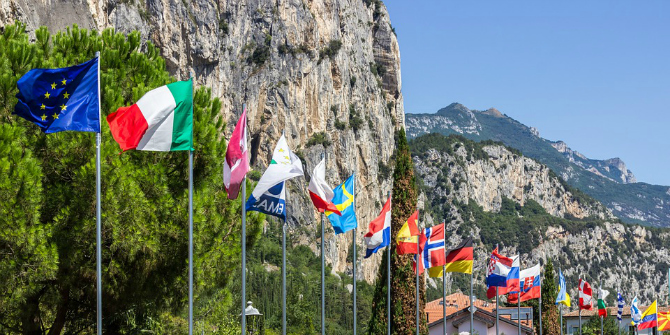In The Golden Passport: Global Mobility for Millionaires, Kristin Surak investigates how selling citizenship to the uber-rich has transformed from an anomalous activity offered by a handful of microstates into an industry with over twelve participating countries that award 50,000 passports annually. Drawing on six years of fieldwork across four continents, the book offers rich and fascinating insight into the global power dynamics and inequalities that shape the contentious practice of citizenship by investment, writes Lior Erez.
LSE hosted a launch event for the The Golden Passport with Kristin Surak on Tuesday 24 October 2023 at 6.30pm. Watch it back on YouTube here.
The Golden Passport: Global Mobility for Millionaires. Kristin Surak. Harvard University Press. 2023.

In most people’s political imaginaries, citizenship is often associated with identity and belonging, and the act of becoming a citizen is seen as one of expressing an intent to become a fully-fledged member of the political community. Indeed, states are increasingly imposing new restrictions and conditions on individuals wishing to naturalise, requiring them to pass citizenship tests, to prove that they are fluent in their new country’s language, and to swear allegiance to the state and its constitution. It is no surprise, then, that “citizenship by investment” (CBI) schemes are often met with surprise and disapproval. The very idea of simply buying one’s way into citizenship seems to go against everything this institution stands for.
‘Citizenship by investment’ (CBI) schemes are often met with surprise and disapproval. The very idea of simply buying one’s way into citizenship seems to go against everything this institution stands for.
Of course, the real world is more complex and nuanced than our intuitive reactions might lead us to believe. Despite the recurrent sensationalist headlines in media outlets, which seem to “rediscover” CBI as a new phenomenon every couple of years, academic scholarship has only recently begun to analyse the practice as it actually exists. As Kristin Surak notes in the introduction to her rich and fascinating book, The Golden Passport: Global Mobility for Millionaires, much of the scholarship thus far has focused on the ethics of selling citizenship, the economic rationale of turning citizenship into a commodity, or on the legality of conferring nationality through investment, but has lacked an empirical investigation. While The Golden Passport is not the first book-length study of this practice (that title belongs to Jelena Dzankic’s 2019 book Global Market for Investor Citizenship), Surak’s monograph stands out for its impressive breadth and the extensive fieldwork underlying it.
Surak’s aim is to provide a comprehensive and multifaceted view of CBI, highlighting the myriad of competing interests, perspectives, and factors shaping and being shaped by this practice.
Surak’s aim is to provide a comprehensive and multifaceted view of CBI, highlighting the myriad of competing interests, perspectives, and factors shaping and being shaped by this practice. Following the introductory chapter, chapters 2 to 4 provide an overview of citizenship by investment, which can be read both chronologically and geographically. Chapter 2 focuses on the precursors of the current industry in island microstates and Hong Kong, where passports exchanged hands for money through officials’ discretion and with questionable legal legitimacy, and then tracks the transformation of CBI into a formalised and (for some) respectable industry in the 2000s. Chapter 3 turns to the European Union (EU) and its battle against CBI schemes in two of its member states, Malta and Cyprus, in the 2010s. Chapter 4 moves to provide a novel and important analysis of the emerging global scene. This includes a special focus on the Middle East (Turkey, Egypt and Jordan), Asia (eg, Cambodia and Pakistan) and Eastern Europe (eg, North Macedonia, Russia, Romania and Moldova).
While at times the discussion of each national and regional context seems somewhat episodic, Surak successfully conveys the transformation and unique features of these programmes, complicating the simplistic picture of existing accounts overly focused on Europe and the Caribbean. The discussion of Turkey stands out (108-111). This new global leader of the industry, now accounting for around half of all CBI naturalisations, is nothing like the paradigmatic cases of CBI. Unlike the relatively poor microstates for which CBI is an economic boon (in some cases, accounting for a large share of their GDP), Surak makes the persuasive case that the Turkish CBI programme relies not merely on the value of a better passport, but on the benefits of living and investing in Turkey itself. This invites a new reflection of the future of CBI.
Unlike the relatively poor microstates for which CBI is an economic boon (in some cases, accounting for a large share of their GDP), Surak makes the persuasive case that the Turkish CBI programme relies not merely on the value of a better passport, but on the benefits of living and investing in Turkey itself.
The following chapters complicate the picture further by introducing geopolitical considerations and the CBI industry, respectively, and thus enrich our understanding of what makes CBI possible. Chapter 5 explores the role and motivations of the major players, notably the US and EU, as well as international organisations such as the International Monetary Fund. In conjunction with a discussion of the politics of microstates trying to manoeuvre between the demands of these giants, the degree to which the CBI industry is shaped by the interests of the powerful is revealing. Third parties can elevate the value of the “product” by legitimising it, or destroy it by revoking visa-free access, as Again, the entry of more powerful states such as Turkey to the market may well reflect a significant change in this dynamic; because the value of their citizenship is not only external, Chapter 6 presents, in my view, the most innovative and significant contribution of the study. Relying on extensive fieldwork and interviews, Surak provides us with an intricate and detailed understanding of the CBI industry, and the power struggles between private and public actors.
Surak explores what drives the “demand” side of the industry, going beyond the commonly discussed motives of facilitated global mobility, insurance against political instability, and wealth planning
In contrast with the thematic unity of the first five chapters, which provide an in-depth analysis of the different actors and transformations of the CBI industry, I found the final three chapters more stand-alone. Each of these addresses an additional question regarding the practice (do states benefit from it economically? What do local people think of them? Why do people buy passports?), but I did not find that they necessarily add to the main aim of the book. This is not to say that these chapters do not contain interesting and important insights. In chapter 9, for instance, Surak explores what drives the “demand” side of the industry, going beyond the commonly discussed motives of facilitated global mobility, insurance against political instability, and wealth planning (although these are of course still important). In the Middle East, CBI programmes in Turkey, Jordan and Egypt cater primarily to residents of these countries (often from war-torn places like Syria, Iraq and Palestine) seeking to secure their status. At times, securing a foreign nationality is beneficial even if one remains in one’s country of origin. Thus, for example, it is beneficial for Vietnamese businessmen to acquire Cambodian nationality in order to be able to access international arbitration courts in cases of dispute with the government (96). In China and Taiwan, where international schools have a quota on the number of local students, it might be better to have your child listed as Kittitian than as Chinese (223). Most interestingly, Surak examine the social meaning of nationality beyond its official legal meaning: even when conferring no legal advantage, some of her interviewees suggest that for foreigners in post-Brexit UK it is still better to hold a European passport. “If they see ‘EU citizen’”, says one, “then maybe they’ll consider me more seriously’” (242).
Surak examines the social meaning of nationality beyond its official legal meaning: even when conferring no legal advantage, some of her interviewees suggest that for foreigners in post-Brexit UK it is still better to hold a European passport.
Notably absent in this otherwise comprehensive book (other than a brief mention in the introduction, 20-21) is the ethical controversy surrounding CBI, which has been the main focus of philosophers, political theorists and legal scholars (including the author of this review). While this might be explained by Surak’s explicit focus on the empirical study of CBI, my sense when reading the book was that this supposed lacuna is a reflection of an implicit suspicion and critical view of these kind of arguments. While Surak’s often ironic prose spares no criticism of the ultra-rich and the CBI industry itself, with their extravagant conferences vacuously celebrating “global citizenship”, there is an undeniable running theme of the book criticising Western (and particularly European) hypocritical moralism regarding these schemes. For example, her analysis of the EU’s crusade against Maltese CBI interprets it as an opportunistic attempt to claim control of this last bastion of state sovereignty (121), and local interviewees in citizenship-selling states are shown to be largely supportive of these programmes, even when, for example they are members of the Cypriot communist party (198). Surak’s methodological coda ends with the story of becoming a British subject, which – even given the United Kingdom’s controversially high naturalisation fees – is sarcastically presented as a bargain (280). Some of these critiques certainly have merit, and undoubtedly any future ethical analysis of CBI will be much improved by Surak’s meticulous investigation into the realities of this industry. However, engaging more systematically with these ethical debates would have further enriched the book.
While Surak’s often ironic prose spares no criticism of the ultra-rich and the CBI industry itself, with their extravagant conferences vacuously celebrating ‘global citizenship’, there is an undeniable running theme of the book criticising Western (and particularly European) hypocritical moralism regarding these schemes.
In sum, The Golden Passport is a compelling and illuminating resource for anyone interested in understanding the intricate world of citizenship by investment and its far-reaching implications. It is commendable for expanding the scholarship beyond the European context, and for providing a detailed map of the complex and multifaceted industry which will be invaluable for future research. The book thus provides a valuable and novel contribution to the ongoing discourse on this fascinating yet contentious practice.
Note: This review gives the views of the author, and not the position of the LSE Review of Books blog, or of the London School of Economics and Political Science. The LSE RB blog may receive a small commission if you choose to make a purchase through the above Amazon affiliate link. This is entirely independent of the coverage of the book on LSE Review of Books.
Image Credit: Andrey_Popov on Shutterstock.
Read an article by Kristin Surak, “Golden passports and visas: the global market in residence and citizenship” from March 2022 in LSE Research for the World.








1 Comments